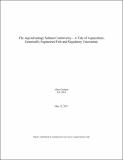| dc.description.abstract | This paper discusses the controversy around the potentially imminent commercialization of the first genetically engineered animal for human food consumption in the United States. The industrialization of commercial fishing in the wake of growing demand has led to a rapid decline in wild fish stocks. Over the last 50 years, modern aquaculture has developed into an important industry, to the point that it now supplies nearly half of all the fish humans consume. Yet modern aquaculture, including its two main commercial products, shrimp and salmon, is also associated with significant environmental problems, as well as other health, social and economic ones. Partially in response to these problems, several companies and countries have turned to genetic engineering as a possible means to improve the efficiency of fish farming. Leading this effort, AquaBounty Technologies, a Massachusetts company with operations in both Canada and Panama, is attempting to commercialize all-female infertile fish for human consumption. Using recombinant DNA (rDNA) technology, AquaBounty created an Atlantic salmon that grows twice as fast as its non-engineered counterpart. By summer 2010, AquaBounty announced that is had successfully fulfilled all the requirements necessary under the FDA’s New Animal Drug Application (NADA), the agency’s current framework for regulating genetically engineered animals with hereditary rDNA constructs. Yet despite what seemed to be the FDA’s inclination to allow AquaBounty to commercialize the AquAdvantage salmon soon after a public hearing held in September 2010, the application continues to stir significant controversy and remains unresolved. The FDA’s cautious response is perhaps unsurprising given the significance of this decision for other pending commercializations of genetically engineered animals and the criticism suggesting the unsuitability of the NADA framework to authorize such novel food. | en_US |


